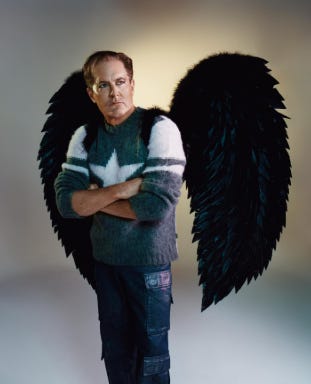How Did Marc Jacobs’ Heaven Become a Gen Z Icon?
Musings on Heaven, nostalgia, and the dichotomy between admiration and controversy.
Printed baby tees seen on Pamela Anderson; vibrant plushies; ultra miniskirts modeled by Gigi Hadid; vintage cds and books; posters and magazines; collaborations with Anna Sui and Sandy Liang; strawberry and butterfly-shaped earrings. It doesn't matter which item we talk about; Marc Jacobs’ Heaven has rapidly become part of the cultural zeitgeist. It was to be expected. Jacob has always been a favorite of youth culture, from his 1993 Perry Ellis grunge collection to his bold tenure at Louis Vuitton in the 2000s. But Heaven just feels different. Since its founding in 2020, Heaven’s grungy and defiant approach to fashion has stood out in unimaginable ways to Gen Z, amassing an impressive cult following.



But its popularity may have less to do with what it sells and more to do with how it does. With a lineup that includes ‘90s and ‘2000s icons like Pamela Anderson, Winona Ryder, Paris Hilton, and Kyle MacLachlan, Gen Z favorites like Alex Consani, Charli XCX, and PinkPantheress, and lots of underground subcultures, Heaven has become a masterclass in appeal.





Alongside the exclusive stock, which certainly adds to its charm, Heaven’s unparalleled branding and marketing strategy frequently leans on nostalgia, a Gen Z favorite, making it hard to look away. Take, for instance, a photoshoot featuring actress Alicia Silverstone embracing her inner Clueless’ Cher, skirts and bags featuring Kirsten Dunst's Lux Lisbon from Sofia Coppola's classic The Virgin Suicides, or even Mena Suvari channeling *that* scene of American Beauty. By revisiting past cult moments, characters and films, Heaven resonates with both Gen Z by tapping into moments they'd like to experience and with Millennials who actually lived through them.



Recently, though, its nostalgic approach seems to have backfired after the release of a campaign featuring actress Iris Apatow and influencer Gabriette paying homage to the film Thirteen.
On Instagram, people couldn’t love it more. ‘‘How do you get it every time,’’ someone wrote. Other uplifting comments followed, ranging from ‘‘whoever directed this needs a raise,’’ and ‘‘I love this.’’ But on X (formerly Twitter), fashionistas were not very happy with the reference.
Most pointed out the casting of twentysomethings as teenagers and the far from the movie’s style outfits. Additionally, some argued against the glamorization of drugs promoted by the movie. Love it or hate it, Heaven remains to be in people's mouth, only cementing its place in the cultural conversation.
In fashion, relevance is currency. And it doesn't matter if it comes through admiration or controversy. Sure, acclaim is ideal — like in those moments where a celebrity wears one of their pieces, a campaign is well-received online, or a collection gets lots of press coverage —, resulting in public desire. But controversies — remember Demna's Balenciaga 2022 polemic? —, just like any moment of admiration, draw attention to a brand, sparking online conversation while generating debate thus engagement.
Both of these different approaches to attracting attention are very common among brands today as they both overcome fashion and entertainment's biggest fear: silence. In a world mediated by social networks where every like matters and every view counts, fashion companies need to create buzz on social media. Not for fun, but for survival. P.S: There's nothing wrong with this marketing strategy — unless you commit a crime, of course. It helps to sell. The problem arises when we pretend these dynamics don't exist.
Clearly, Heaven is not just about the admiration and controversy dichotomy. In fact, it's the first time I've seen such a new born brand like Heaven get involved in a polemic. But that doesn’t mean it couldn’t use this approach, along with tapping into the appeal of ‘‘niche’’ subcultures — a favorite in the age of ever-changing trends shared on TikTok — collaborating with a variety of artists and public figures that Gen Z admires, and alluding to nostalgia and classics to really thrive amid social media era.
It would be naive to consider this Thirteen & Heaven incident a mere accident. Sure, it could be. Then again, it could also be a deliberately attention-grabbing tactic. In an age where celebrities wear archive fashion not for the sake of fashion, but rather for virality, the odds are there. We’ll never know. Still, by establishing relatability and building connections with younger audiences who crave the idealized glamour of the past in an age of widespread inauthenticity, while simultaneously positioning itself as a daring and in touch with pop culture label, not only does Heaven stands out in the crowded sea of fashion but it also ascends as a true legend for Gen Z.
What are your thoughts on Heaven? Spill!









parfait!!!!